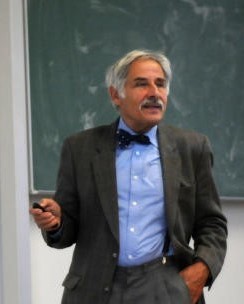Categories: Israeli-German science cooperation
 Prof. Huefner studied physics at the University of Heidelberg. As a doctoral student in 1963, he visited the Weizmann Institute. In 1971 he became professor of theoretical physics in Freiburg, and in 1973 in Heidelberg.
Prof. Huefner studied physics at the University of Heidelberg. As a doctoral student in 1963, he visited the Weizmann Institute. In 1971 he became professor of theoretical physics in Freiburg, and in 1973 in Heidelberg.
 Interview with Joerg Huefner.pdf
Interview with Joerg Huefner.pdf
Interview Excerpt
UD: What were the scientific benefits of the collaboration for the institutes in Heidelberg? I think that a fruitful collaboration is one which is based on an exchange of complementary research. How did research in theoretical nuclear physics in Heidelberg differ from that at the Weizmann Institute?
JH: The collaboration consisted mostly of the exchange of young people. Therefore its standard could not be very high. But there was an intellectual exchange at the level of established scientists, too, for example through visits and conferences, not necessarily through joint publications. And there were indeed complementary approaches. Let me come back to the example of Jensen. The Weizmann Institute was clearly more mathematically oriented. The scientists there knew mathematics, but Jensen who was an outstanding physicist, but not very strong in mathematics.
At the beginning of the 1960s the Weizmann Institute had a higher standard than the Heidelberg department; not only in physics, but also in the way science was conducted, in Israel they had already implemented the Anglo-Saxon approach. It was an international institute, and the contacts helped to improve the level of scientific work and the international recognition of physics in Heidelberg.
The collaboration also had political ramifications; it helped to internationalize German science. The collaboration with Israel opened the door to contacts also with institutes and departments in the world. At the time, Germany was still strongly internationally boycotted.
UD: Which benefit did the collaboration have for the Weizmann Institute?
JH: The Weizmann Institute benefitted in the main financially, for example by receiving research grants. There were a few people who had broader visions, but as was the case with Ben-Gurion and Adenauer the financial aspect was the most important one for Israel.
Related Interviews: Uzy Smilansky